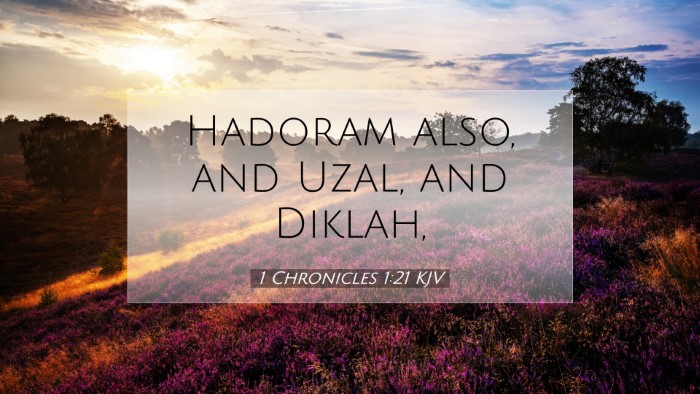Commentary on 1 Chronicles 1:21
This verse reads: "The children of Shem; Elam, and Asshur, and Arphaxad, and Lud, and Aram." In this succinct verse, we find the names of key ancestral figures in the genealogy traced through Shem, one of Noah's sons. Understanding this verse requires a contextual analysis of the significance of these names within the biblical narrative and theological implications.
Historical Context
The genealogies found in Chronicles serve not only as an account of lineage but also as a reflection of God’s promises and the establishment of various nations and peoples. The genealogies provide critical insight into the heritage of Israel and their relationship with the surrounding nations.
Analysis of Names
-
Elam:
Elam represents the ancient civilization located in what is now southwestern Iran. The Elamites were known for their conflict and interactions with Israel and surrounding nations, indicating a rich historical context for God's dealings with diverse groups.
-
Asshur:
Asshur is typically associated with the Assyrian Empire, known for its military prowess and significant impact on Israel's history, especially during the periods of the divided kingdom.
-
Arphaxad:
Arphaxad is particularly noted as an ancestor of Abraham. This linkage is paramount as it connects the Semitic line to the patriarchal narratives, thus emphasizing the covenant promise of God to Abraham’s descendants.
-
Lud:
Lud is less frequently mentioned in scripture, but his descendants were likely associated with regions in North Africa and possibly parts of Asia Minor, reflecting the broad dispersion of peoples.
-
Aram:
Aram refers generally to regions associated with the Arameans, encompassing a wide area in the Near East. This name also acts as a precursor to notable figures in the Old Testament including the ancestors of certain tribes and cities.
Theological Implications
As we explore the names in 1 Chronicles 1:21, a few theological themes emerge:
-
Covenant and Promise:
Each name signifies not just a lineage, but God's unfolding plan through these families that eventually leads to the establishment of Israel and the fulfillment of divine promises.
-
The Inclusion of Nations:
This verse encapsulates the idea that God's plan is inclusive of nations beyond Israel. The mention of these different peoples prefigures the global scope of salvation history, culminating in the Gospel.
-
God’s Sovereignty:
The meticulous recording of genealogies reflects God's sovereignty in human history, establishing nations according to His divine plan. This assures us that nothing is random in God's providence.
Comparative Commentary Insights
According to Matthew Henry, the genealogies affirm God's faithfulness to His promises, as seen in the continuity from Noah to the patriarchs. Albert Barnes comments on how these historical accounts lend credence to biblical narratives, offering a framework of understanding regarding the relationships and political landscapes of ancient times. Adam Clarke emphasizes that each name represents not just an individual but the heritage of nations, relevant to the broader story of God's work among humanity.
Conclusion
In summary, 1 Chronicles 1:21, while brief, invites deep reflection on the specifics of biblical genealogies and their broader implications. For pastors, theologians, and students of the Word, understanding these names enriches the appreciation for divine orchestration in biblical history and emphasizes the interconnectedness of all people in God’s overarching plan of redemption.


